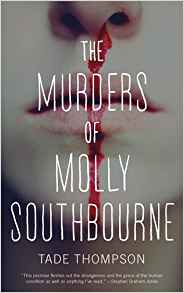Caren Gussoff Sumption Reviews Light Years from Home by Mike Chen
 Light Years from Home, Mike Chen (MIRA 978-0-7783-1173-7, $28.00, 353 pp, hc) January 2022.
Light Years from Home, Mike Chen (MIRA 978-0-7783-1173-7, $28.00, 353 pp, hc) January 2022.
The American painter, Conrad Marca-Relli, was known best for his abstract depictions of the body. He often relied on cut paper forms to build his work, famously stating, ‘‘You get a linear quality from collage that is more rapid than the swiftest drawn line.’’
While Mike Chen’s newest novel, Light Years from Home, is far from abstract, Chen uses an interesting form of literary pastiche to drive the book: a frustrating, moving portrait of a broken family forced to heal old wounds.
The Shao family always had struggles. Fifteen years ago their father, Arnold, and one of the eldest twin siblings, Jakob, went missing on a camping trip. Arnold returned, a few days later, confused, clutching onto a strange object and a story of alien abduction. Jakob, however, seemed to be gone – forever.
Jakob is, indeed, gone: conscripted into an alien army fighting an intergalactic war. And in the decade and a half he’s been gone, he has developed into a competent soldier, engineer, and devotee to the cause of fighting for the universe’s freedom on the side of the ‘‘Seven Bells,’’ the aliens who plucked him from Earth all those years ago.
He’s barely thought of the family he left behind, as the time passed. He doesn’t know – or care – what happened to his father, who died searching for him; his mother, Sofia, who’s slowly lost herself to dementia; his twin, Kassie, a divorced family therapist singlehandedly caring for their mother; or his youngest sister, Evie, who’s taken up the mantle searching for Jakob as part of a UFO conspiracy network. The fact that Jakob returns home at the start of the book, in fact, has nearly nothing to do with reconnecting with his family. He’s come back to Earth for safety, having escaped as a POW with information key to possibly ending the great war, once and for all – as long as he can find the device he transported ahead of himself that will unscramble this information, which he himself encoded for security against enemy spies. But he’ll need help. He’ll have to go home.
So begins the multi-POV collage of past and present, memories seen through different eyes. All of the siblings have caused pain and are pained. We spend a good amount of time in each sibling’s perspective, accumulating slivers of the larger story. The story of Light Years from Home is not what we think it is.
Kassie is resentful and exhausted, having held everything together without help from Evie. Evie is elated that Jakob has returned, and even more so that her theories of extraterrestrial life are correct – but crushed to find that her self-involved absence has caused their mother to not recognize her. Jakob made his choice to vanish and stay gone, never contacting his family (even as it’s revealed that he, probably, could have, at any point), frustrated that he’s unable to communicate the stakes of his mission to his sisters.
Only Jakob ever feels these stakes. It’s a battle for everything, for all life, everywhere, ever. But there’s no immediacy for anyone but him. His sisters are dragged along, first forced to confront one another and him, then pursuing him when he bolts from the family home after draining his mother’s bank account.
They have to find him. They can’t allow him to disappear again. Plus, the FBI is now involved, because they suspect Jakob of involvement in domestic terrorism. If the FBI finds him first, the family will never get answers, never know if he’s suffering from straight-up mental illness and psychotic delusions or is, indeed, an elite alien soldier who can help end a horrible war.
These are, also, the stakes readers are left with. Though we do get quite a bit from Jacob’s perspective, we’re just told, over and over again, the paramountcy of the war. We don’t ever feel it on an emotional level. Instead, Chen leans into the sheer weight of the Shao trauma. Though none of the characters are particularly likeable (except Sofia, who gets a marvelous bout of lucidity, just when her children need her), they are all plausible, rounded, and worthy of redemption – urgently. There is a real urgency to have the sisters catch up with Jakob, in order save him from the authorities and/or himself. There is an urgency for the siblings to talk to each other, if not to forgive, then at least to move forward. The family moment is what’s critical. We go into Chen’s novel, expecting a story of a soldier. Instead, the swift line built by Light Years from Home’s careful collage points towards the futility of winning a galactic war – the macro level – when one can’t triumph on the micro level, the family unit itself. What else is more worth saving?
Caren Gussoff Sumption is a writer, editor, Tarot reader, and reseller living outside Seattle, WA with her husband, the artist and data scientist, Chris Sumption, and their ridiculously spoiled cat-children.
Born in New York, she attended the University of Colorado, the School of the Art Institute of Chicago, Clarion West (as the Carl Brandon Society’s Octavia Butler scholar) and the Launchpad Astronomy Workshop. Caren is also a Hedgebrook alum (2010, 2016). She started writing fiction and teaching professionally in 2000, with the publication of her first novel, Homecoming.
Caren is a big, fat feminist killjoy of Jewish and Romany heritages. She loves serial commas, quadruple espressos, knitting, the new golden age of television, and over-analyzing things. Her turn offs include ear infections, black mold, and raisins in oatmeal cookies.
This review and more like it in the April 2022 issue of Locus.
 While you are here, please take a moment to support Locus with a one-time or recurring donation. We rely on reader donations to keep the magazine and site going, and would like to keep the site paywall free, but WE NEED YOUR FINANCIAL SUPPORT to continue quality coverage of the science fiction and fantasy field.
While you are here, please take a moment to support Locus with a one-time or recurring donation. We rely on reader donations to keep the magazine and site going, and would like to keep the site paywall free, but WE NEED YOUR FINANCIAL SUPPORT to continue quality coverage of the science fiction and fantasy field.
©Locus Magazine. Copyrighted material may not be republished without permission of LSFF.






